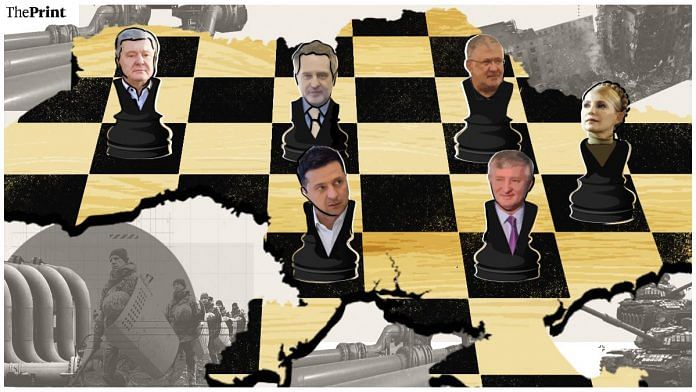Follow the money,” Deep Throat famously advised two reporters on the Watergate story. As it happens, that is one way to understand Ukraine’s politics, and the twists and turns in its history since the break-up of the Soviet Union. Because if any country has been run by its oligarchs (businessmen who also straddle politics and policy), it is this schizophrenic one that is mostly ethnic Ukrainian but also part Russian (among other identities), and caught in a perennial tug of war between East and West.
The story should perhaps begin with a meeting in 2006 that Ukraine’s then president, Viktor Yushchenko, called with his prime minister, some senior ministers, and an oligarch named Dmitry Firtash, who headed the country’s chamber of commerce. As Mr Firtash related to the Financial Times recently, the pro-Western president told the meeting that Ukraine must join Nato before Russia became strong enough to block such a move. The Russian-leaning prime minister (PM), Viktor Yanukovych, disagreed and stormed out after an argument.
Mr Firtash had made his money dealing in gas, selling it from Turkmenistan to Ukraine, using the Russian Gazprom’s pipelines. When Mr Yanukovych’s job as PM went to Yulia Tymoshenko, she cut Mr Firtash out of the gas business and did a deal directly with Vladimir Putin and Gazprom, and that infamously resulted in much higher gas prices in Ukraine. Ms Tymoshenko is known in the West as the heroine of Ukraine’s 2004 Orange Revolution, which ousted a pro-Russian president. In Ukraine she is the “gas princess” who did the deal with Mr Putin. Smart, you might say, for playing both sides, except that she now had a bitter foe in Mr Firtash.
In 2010, the “gas princess” stood for president. So Mr Firtash successfully bankrolled her opponent, the man she had replaced as PM. As Mr Firtash explained to the Financial Times, his support for Mr Yanukovych had nothing to do with being pro- or anti-Russian, he was merely settling scores with Ms Tymoshenko, who was soon in jail for the gas deal. Many in and outside the country saw it as political, i.e. the kind of action taken by India’s “agencies”.
Also read: Why late-comer India has an advantage in embracing the Green economic transition
Mr Firtash is only one of Ukraine’s many oligarchs. Much bigger than him is Rinat Akhmetov, the de facto ruler of Donbas, the home of Ukraine’s heavy industry, which Mr Putin has his eye on. Between them, the two oligarchs are said to have controlled ministerial appointments and half of Mr Yanukovych’s party in parliament. Both prospered. Spiegel called their control of politics a “business joint venture”. But, being canny players, they had begun to hedge their political bets even before the Maidan revolution erupted in 2014. Mr Firtash for one feared the return of the “gas princess”. As things turned out, Mr Yanukovych had to flee to Russia. An angry Putin then grabbed Crimea and backed separatist rebels in Donbas.
Enter now a third oligarch, Igor Kolomoisky, who in the 1990s had partnered with a fourth oligarch, Henadiy Boholyubov, to start what became Ukraine’s largest bank. Following a pattern, Mr Kolomoisky was soon in the crosshairs of the new president, Petro Poroshenko, an oligarch himself known as the “chocolate king”. Mr Kolomoisky fled abroad, his bank having been nationalised for fraud in 2016.
But when election time came around in 2019, Mr Kolomoisky was back in the game. His TV channel promoted Mr Poroshenko’s rival, a comedian named Volodymyr Zelenskyy, who now leads Ukraine’s fight against Russia. Mr Zelenskyy ran his election campaign on an anti-corruption platform and won handsomely, but he fits the picture well. First, the “Pandora Papers” showed last year that the new president and key aides were beneficiaries of a network of offshore companies. Second, Mr Zelenskyy turned on his former sponsor two months ago and cancelled his citizenship!
Ukraine is a warning to countries captured by oligarchs. In Kyiv they have amassed vast fortunes while they and their media empires have promoted and pulled down political candidates, determining whose nominee would get which ministerial portfolio, who would supply gas at what price, which political party to prop up and control, and who would play Mr Putin’s cat’s paw. Meanwhile, Ukraine’s pre-war GDP was where it was 15 years ago. While the oligarchs have played fast and loose, the country remains by far the poorest of the ex-Soviet economies of Europe. Now close to a third of its population has taken refuge in neighbouring countries. Such is the benighted place that might spark nuclear war.
By special arrangement with Business Standard
Also read: Why Modi govt needs to reconsider spending on physical rather than social infrastructure



